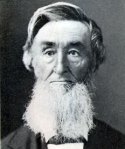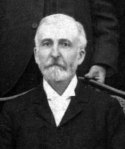Two men from UConn’s early history share March 2 as their birthday. So we offer up best wishes to the memory of Theodore Sedgwick Gold, an unsung founder of the Storrs Agricultural School, and George W. Flint, second president of the school when it became Connecticut Agricultural College.
Gold, one of the first trustees of the school when it was established in 1881, was born on March 2, 1818 in Cornwall, Connecticut. In 1845, he joined his father, Dr. Samuel Gold, in founding an agricultural school for boys, the Cream Hill School, in West Cornwall. Even before the school closed in 1869, Theodore was a champion for establishing a state agricultural school for boys, and, in his 50th anniversary history of Connecticut Agricultural College in 1931, Walter Stemmons wrote that “Gold was in a position, at least after 1866, to impress his educational ideas upon the Storrs brothers. The striking similarity in form and substance between the Cream Hill School and the Storrs Agricultural School is evidence which cannot be ignored.” As a member of the state school’s initial Board of Trustees, Gold headed a subcommittee charged with the new school’s organization. For many years he was secretary of the board, and in 1900, he wrote the first history of the college. A copy of that history is part of the Gold family papers in the University’s archives.
George Flint’s tenure with the college was much briefer than Gold’s, and a good deal more controversial. During his first year as president, Flint saw what had been Storrs Agricultural College since 1893, become Connecticut Agricultural College in 1899. But by then, he was at the center of a dispute that became known as the “War of the Rebellion.” Flint’s interest in classical education over agricultural, and his efforts to incorporate them into the curriculum of CAC brought him into direct conflict with members of the faculty.
The “war” was played out, in part, through letters-to-the-editor columns of newspapers in Connecticut New York, and Boston. Long-time faculty resigned, and, at the request of trustees, Flint resigned in 1901.


